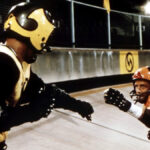- Next story Monday Movie: The Ballad of Jack and Rose, by David Bax
- Previous story Space Invaders commentary!
SUBSCRIBE
ADVERTISEMENTS
More
In this episode, Tyler and David discuss directors who only made one good movie and Tyler introduces a new game called This or That.








This site uses Akismet to reduce spam. Learn how your comment data is processed.
More
The worst part of that New Radicals song, to cite wikipedia:
*** Much of the media attention “You Get What You Give” received centered on the closing lyrics:
“Health insurance, rip-off lying
FDA, big bankers buying
Fake computer crashes dining
Cloning while they’re multiplying
Fashion shoots with Beck and Hanson,
Courtney Love and Marilyn Manson
You’re all fakes, run to your mansions
Come around, we’ll kick your ass in.”
According to Alexander, he had written this section for the song as a test: to see whether the media would focus on the important political issues of the first few lines, or the petty celebrity-dissing. As suspected, a considerable amount of press began to appear about the name-dropping, and the other political issues were largely ignored. ***
Like, he honestly thought that was gonna cause political discussion? What is bringing up the FDA and bankers supposed to signify? What are fake computer crashes and how are they dining, and how does a computer crash clone or multiply? Even stoner jam bands write lyrics more likely to start insightful political discussions than the New Radicals song. It’s bad and that dude should feel bad.
HOT TAKE: Heathers isn’t all that great but Airheads is an unsung classic.
Insane how much good stuff is in that film. Somebody needs to do the big Sarris list of 90s comedies.
Chaplin vs. Keaton = Chaplin?, I guess…
The problem with this one is that I have a different answer for films vs. performance. I think overall Keaton is the much better physical comedic actor, but film wise I think there is generally more going on in Chaplin’s films stylistically and thematically.
Pacino vs. De Niro = Pacino
Particularly in Dog Day Afternoon and The Godfather, Pacino feels somewhat more vulnerable, more unpredictable… not by being more violent or sporadic, but because you’re not quite sure if his characters have the capability to do what they’re doing. (forget Scarface) Whereas, De Niro feels generally less interesting, like he has the capability and confidence for anything – which I think is why more people would go for him.
Dicaprio vs. Damon = Damon
I think I like Damon a little more. His characters don’t spring to mind as much variety as Dicaprio’s, but as a screen presence, I see him as blending into character sensibilities and emotive more, whereas with Dicaprio, great actor, but it’s difficult not to just see the star Leonardo Dicaprio playing a role for me.
Hitchcock vs. Ford = Hitchcock
Again, like both. But, for the exact reasons stated on the show, the dark comedic traits of Hitchcock are just something that makes the choice an easy one.
Lang vs Murnau = Lang
Until about a month ago, I might have said Murnau, but I’m writing a dissertation at the moment on the use of sound in the films of Fritz Lang. Through doing so, I’ve discovered many great films. Have either of you seen any of the Dr. Mabuse films Lang did? He directed two silent Mabuse films and a sound one early on. I’m not sure why no one seems to talk about these films because they are all absolute masterpieces (they’re overshadowed by Metropolis I think) I’d vote for Lang just for these films alone.
As a suggested This or That, I’d say David Cronenberg and David Lynch have similar sensibilities, but I would personally go with Cronenberg.
I reviewed one of Lang’s Mabuse movies!
http://battleshippretension.com/home-video-hovel-dr-mabuse-the-gambler-by-david-bax/
– David
When Tyler was talking about “Directors that I think are bad but have made a good movie” and that being a topic for a future episode, maybe the subject should be “the exception that proves the rule” or “the movie that sticks out like a sore thumb”.
What I’m suggesting is a topic on directors/actors that have a great resume with the one notable exception or vice a versa, a terrible filmography with one bright spot.
Re:Bryan Singer – I think David is a little harsh, X2 is his best film, but David is being a tad dismissive of the rest of his work. Also, I don’t care what other people say, Superman Returns is underrated.
Superman Returns is exquisite, one of the very best superhero films of the modern era
What about Michel Gondry and Eternal Sunshine of the Spotless Mind?
I just watched that last night so that was the first movie to jump to mind. I agree!
Chaplin or Keaton: Probably KEATON, as Chaplin’s sentiment can get in the way.
Ford or Hitchcock: HITCHCOCK, but I haven’t seen much Ford, and Hitchcock is my favourite director.
Cruise or Denzel: This surprised me, but my gut response was CRUISE. I admit that may be because I really enjoy the Mission Impossible films (with the exception of MI2).
Lang or Murnau: I need to see more from both of them, but Metropolis and M are both incredible, so I have to go with LANG.
Pacino or De Niro: For his work with Scorsese, I have to go with DE NIRO.
GoodFellas or Godfather: Easily GODFATHER
Jaws or Jurassic Park: This one was really tough, but I have to go with JAWS because it is flawless and I have minor quibbles with Jurassic Park.
And my suggestion: Vertigo or Psycho?
i view Denzel like Gene Hackman. Always good (better than the project, often), the movie as a whole is never crap, and occasionally: Oscars.
Cruise, too, to some extent, except he’s completely forsaken the occasional stab at Oscar bait since Lions for Lambs
Hating on the Beach Boys, the Band, and The Usual Suspects in the same episode? Say what you will about The Usual Suspects, but it’s still (at the very least) a GOOD film. Bryan Singer is far from a one-hit wonder.
also: does Bryan Singer get any credit for House, MD? He produced and directed the pilot (of a relatively formulaic/procedural show).
Interesting discussion about one-shots and Birdman. Personally, I think the one-shot worked really well for me, for a specific reason. Normally one of the defining points about a one-shot is that it provides something concrete about time. Time can pass when you cut between shots, but usually the flow of time in a shot is concrete – a 60-second shot involves a 60-second period of time. But in Birdman weeks pass during the shot without any indication that the time is passing. To me, Birdman seemed to be about someone dealing with depression and mental illness, and the use of the one-shot created a world where time is just drifting past Keaton and he’s not even aware of it because of the issues he’s dealing with. Now, I’ve never dealt with depression, so I don’t know if this is really what it’s like, but my impression was that it was an effort to communicate the way this person experiences the world. It’s a bit like what Tyler was saying about being on auto-pilot while in the theatre and not even being aware when you go on stage, except that that’s how his entire life is, so that one-shot approach makes sense to be applied to the entire film.
I guess i’m the only fan of Andrew Davis’s other movies. The Package (Gene Hackman & Tommy Lee Jones) is pretty good, as is Code of Silence (Chuck Norris as Chicago Cop) – plus, he made the two best Steven Seagal movies (Above the Law & Under Siege).
Most of his movies are chicago-based, too, which might be part of my interest. But Davis also directed Arnold’s best non-world-thrashing-movie (Collateral Damage), and is always a reliable quality-movie-director (like a Jon Dahl).
I liken Davis’s career to Curtis Hanson. One GREAT movie (LA Confidential) and lots of other quality movies (Hand/Cradle, River Wild, 8 Mile, Wonder Boys, etc)
I also always confuse the two. Davis is highly underrated and a genuine auteur interest.
whenever i see a movie on cable with 1-2 name actors and find myself thinking, “This is better than it deserves to be. Who directed it?” the answer is almost always Curtis Hanson or Andrew Davis.
Heck, Andrew Davis also directed Chain Reaction, which is another Chicago-based “thriller”, which is less than a sum of its parts. It’s better than its script, which is its main failing, and Keanu can’t quite pull off “lab assistant”.
But at least it gave us Keanu & Rache Weisz, before they reunited in the (relatively) superior Constantine (another case of the direction saving flawed material).
I’m a big fan of The Fugitive, and I might be a fan of Davis in general – I’d have to revisit some of them to be sure. Fugitive is certainly the one I’ve seen the most times. I remember seeing The Package once when I had Netflix DVD service. I rented it solely because of the names of Davis, Hackman, and Jones (Dennis Franz, Pam Grier, and Chelcie Ross weren’t bad to have around either). In tone and action style, and with a score by James Newton Howard, it was a lot like the Fugitive, but the story and overall execution fell short as I recall. It seemed like a necessary “practice film” for Davis, as if it was essential for him to have gone through the experience of The Package, for the success of The Fugitive to have been possible. They did not share a writer, I find it interesting that the main writer for The Fugitive is the writer/director of the films of the Riddick franchise (David Twohy).
How’s this for a on-hit wonder: American History X director Tony Kaye.
I think that you missed out on some of Mathieu Kassovitz’s work. If anything he’s a three hit wonder, Cafe au lait, La Haine, and Crimson Rivers. The bigger budget American movies he made were the ones that were less than successful.